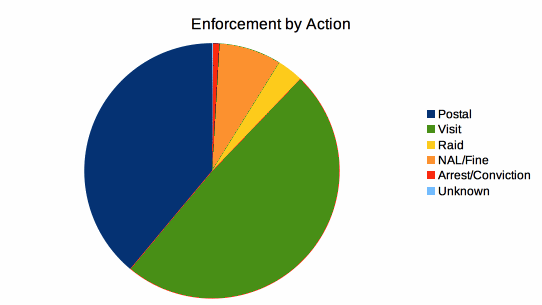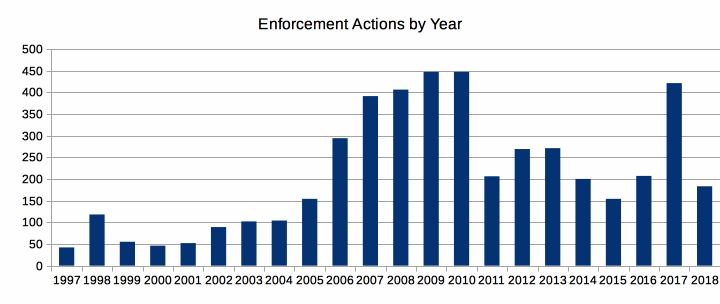After a week-long, non-transparent deliberation, the Federal Communications Commission has reportedly signed off on the merger of the XM and Sirius satellite radio networks.
Many of the tea leaf-readers did not correctly forecast the outcome: most expected at least one Democratic Commissioner, Jonathan Adelstein, would vote for the merger, provided there were certain public interest obligations on the new, singular satellite broadcast entity. These would have included requirements such as a percentage of total satellite radio capacity be devoted to non-commercial, possibly public-access channels, and that the new company provide tiers of service that do not gouge existing and future subscribers. Some of these conditions will apply to the merged company, but the Commissioners’ votes themselves ultimately split along party lines. Continue reading “XM/Sirius Merger Hinged on Piracy Compliance”
Tag: enforcement
FCC Enforcement Focus Diversifying?
When it comes to unlicensed broadcasting, I only monitor the FCC’s activity against pirate AM, FM and shortwave stations. And as far as those areas are concerned, the FCC is on relative track to meet its record-breaking enforcement effort of last year.
 However, the devil is in the details. As you can see from the breakdown of enforcement activity at right, nearly 80% of all FCC enforcement actions fall into the categories of station-visits and warning letters. Continue reading “FCC Enforcement Focus Diversifying?”
However, the devil is in the details. As you can see from the breakdown of enforcement activity at right, nearly 80% of all FCC enforcement actions fall into the categories of station-visits and warning letters. Continue reading “FCC Enforcement Focus Diversifying?”
Hiatus Ahoy: Notes While Away
My work online here will significantly slow down over the next couple of months, as I enter the most critical phase of my graduate studies to-date. Once I hopefully become ABD (“all but dissertation”) in early May, some of the pressure ease. But then I’m immediately leaving the country for an exploratory workshop hosted by the European Science Foundation on the impact of digitalization with regard to community media. As one a handful of non-EU “experts” invited to the event, I expect my role will primarily be to warn other countries in the midst of formulating, adopting, or modifying digital radio standards to stay as far away from iBiquity’s HD protocol as they possibly can.
Expect “regular” content-generation to resume sometime in late May or so. I made updates to the Schnazz, Truthful Translations, and Enforcement Action Database over the weekend, so those are up to date, at least in the near term.
In the meantime, keep an eye on these stories: Continue reading “Hiatus Ahoy: Notes While Away”
Microradio: As Pawn and Pain In the Ass
It’s hard to imagine that the FCC in 2007 would end the year with such a thud, but it has. With the promulgation of a rule effectively repealing the ban on newspaper/broadcast station cross-ownership – drafted in the dead of night, formally introduced in a newspaper op-ed, modified without consensus, and approved along partisan lines, with outright disdain for the 99.99% margin of public disapproval of both the practice and policy – Kevin Martin’s FCC has firmly put itself in the political cross-hairs.
A lawsuit to challenge the ruling is in the works, and members of Congress are yelping as their constituents call all pissed off (and rightly so); they’re pondering taking actions ranging from a “resolution of disapproval” of the FCC’s cross-ownership action, to a bill formally repealing the FCC’s decision, to a campaign to scrutinize and overhaul the FCC itself next year. The latter option would definitely be the most interesting to observe – anytime an agency goes into the legislative woodshed for restructuring, it’s going to disrupt business as usual. Regardless, this issue is far from finished, and still has the potential to undertake several dangerous iterations. Continue reading “Microradio: As Pawn and Pain In the Ass”
FCC On Track to Meet/Beat Enforcement Record
As the graph to the right shows, the agency’s Enforcement Bureau is well on pace to meet or exceed last year’s record-breaking enforcement action effort.
 Looking more closely at the data, one can see how FCC field agents are escalating the initial levels of the enforcement protocol much more quickly now (for example, the New York field office has cut the time between visit to warning letter down to as little as eight days). Continue reading “FCC On Track to Meet/Beat Enforcement Record”
Looking more closely at the data, one can see how FCC field agents are escalating the initial levels of the enforcement protocol much more quickly now (for example, the New York field office has cut the time between visit to warning letter down to as little as eight days). Continue reading “FCC On Track to Meet/Beat Enforcement Record”
Attorney General Nominee No Friend of Pirates
Recently, former federal judge Michael Mukasey was nominated to be the next Attorney General of the United States. There’s lots of punditry going on within the mainstream media about his past legal leanings (surprise, they’re reactionary!), but Mukasey’s also been involved in microradio case law to a degree not experienced by any other contemporary Attorney General. It was back in 1998, when the Steal This Radio collective preemptively sued the Federal Communications Commission in hopes of stopping a station raid or other major, life-threatening enforcement action.
STR’s lawsuit was not the most well-thought-out piece of legal argument. It took a shotgun approach to the FCC’s licensing authority: some claims alleged the Communications Act itself was unconstitutional because it gave the FCC excessive latitude to restrict access to the airwaves via the licensing mechanism; one claim specifically attacked the practice of auctioning off commercial radio licenses for limiting “free expression” only to those who can afford it. Another posited the radio spectrum as a public forum, which necessitated the strictest scrutiny of government attempts to regulate it; under such analysis, the broadcast licensing regime was overly restrictive and therefore also unconstitutional. Continue reading “Attorney General Nominee No Friend of Pirates”
FCC Now Taking Pirate Complaints Online
In a message circulated exclusively within the broadcast industry this week, the Federal Communications Commission has unveiled an online pirate radio snitch/complaint form.
The page, nestled within the Enforcement Bureau section of the FCC’s website (though not yet linked publicly, as it’s currently in “beta test”), requests information on the station’s name, address, operating frequency, dates/times of operation, and whether or not the station has an online presence (MySpace page, blog, etc.). This information, once submitted, “will be automatically forwarded to the closest Field Enforcement Office” for further investigation.
This is a development with mixed consequences. On the one hand, it makes the complaint process much simpler for licensed broadcasters, who used to have to navigate somewhat complicated bureaucratic channels in order to make sure their concerns were heard. Thus, one might expect the number of complaints filed against pirates to rise. It certainly has taken the FCC long enough to harness the power of the Internets to help do its job. Continue reading “FCC Now Taking Pirate Complaints Online”
Boston Pirate Tickles FAA Frequency
The story, of course, makes national news because it feeds into the industry-foisted myth that pirate radio has the potential to make airliners fall from the sky. Buried within the copy is the admission, however, that the affected channel at Boston’s Logan International Airport prevented “air traffic controllers from communicating with private aircraft, but not commercial airlines, on the frequency published to all pilots” [emphasis mine]. A follow-up story also notes that the dirty pirate station is but one of about a dozen known to broadcast regularly in the Boston metropolitan area, none of which are reported to interfere with anything. Continue reading “Boston Pirate Tickles FAA Frequency”
Free Radio Olympia Off-Air But Online, For Now
It seems that the FCC’s sweep of microradio is not leaving the old guard alone. Several long-running microradio stations have been visited by the FCC recently, including two individuals specifically targeted from the Free Radio Olympia collective, which sent out this missive: Continue reading “Free Radio Olympia Off-Air But Online, For Now”
FCC Enforcement On Record Pace, Again
A long-overdue update to the Enforcement Action Database reveals that the FCC’s conducted more than 130 enforcement actions against pirate stations this year – nearly apace for all of 2005, when the FCC first began taking an administratively tougher stance on unlicensed broadcasting in a post-LPFM world. If this rate of activity stays constant the year could very well end on the north side of 400 enforcement actions.
 I call the FCC’s posture on pirate radio “administratively tougher” because, as the raw data shows, the agency has a hard time escalating its enforcement protocol. The duration between initial site-visit and follow-up warning letter is now in the 10-day range. Sometimes the period between a warning letter and fine can be as short as a month. Continue reading “FCC Enforcement On Record Pace, Again”
I call the FCC’s posture on pirate radio “administratively tougher” because, as the raw data shows, the agency has a hard time escalating its enforcement protocol. The duration between initial site-visit and follow-up warning letter is now in the 10-day range. Sometimes the period between a warning letter and fine can be as short as a month. Continue reading “FCC Enforcement On Record Pace, Again”